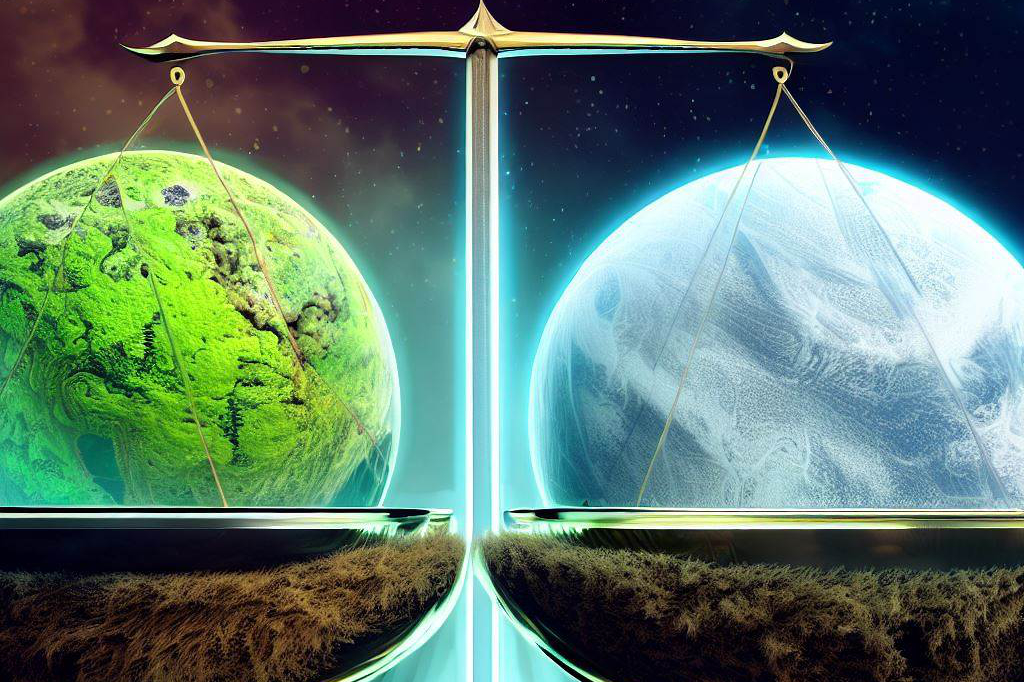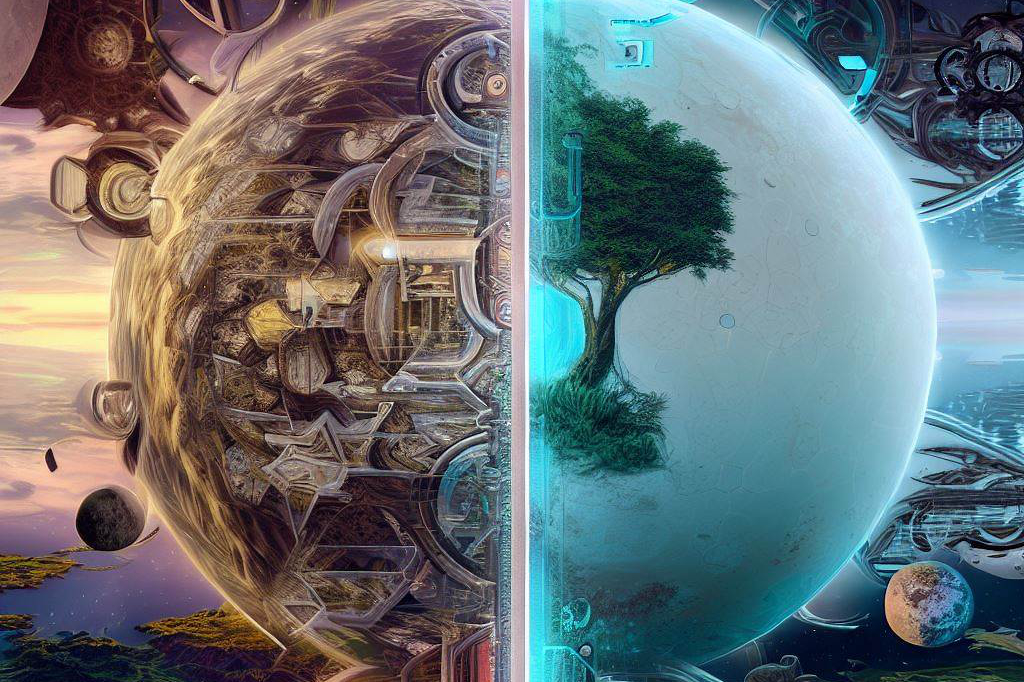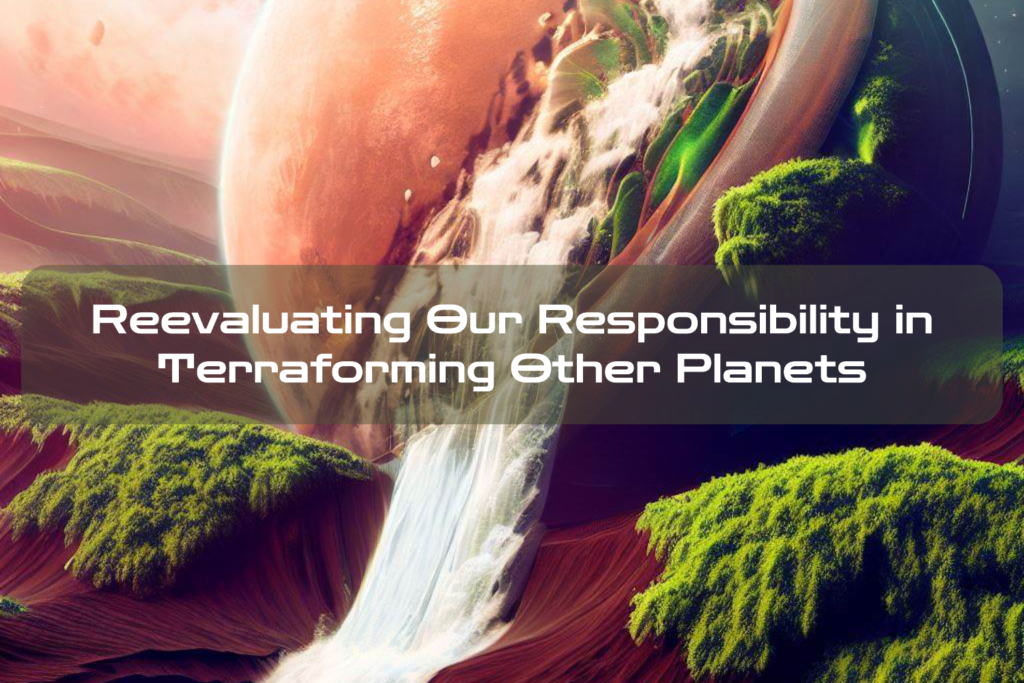The Promise and Problems of Terraforming
Terraforming is the concept of transforming a planet or other celestial body into one that is similar to Earth, with a breathable atmosphere, liquid water, and a hospitable climate. The idea has captured the imagination of science fiction writers and space enthusiasts for decades.
However, terraforming also raises serious ethical questions about our responsibility to other planets and their ecosystems.
The potential impact of terraforming on other planets is immense.
The process involves altering the existing environment by
- introducing gases such as oxygen or carbon dioxide,
- building infrastructure such as atmospheric generators or artificial oceans,
- and even introducing new life forms from Earth in order to create an ecosystem
that can support human habitation. But these changes don’t only affect the planet being terraformed – they could have unintended consequences for any native life forms that exist there.
Why Ethics Matter
It’s crucial that we have discussions around the ethics of terraforming before we begin any process like this.
At its core, ethics is about determining what actions are right or wrong in a given situation.
When it comes to terraforming, we need to weigh the potential benefits against the risks and harms involved.
There are many ethical issues at play here.
For example:
What right do we have to fundamentally alter another planet’s ecosystem?
How do we balance our desire for exploration with our responsibility to protect other life forms?
Can we truly predict all possible outcomes of terraforming?
Ultimately, these questions must be answered before any action is taken towards terraforming another planet. We must look at the evidence from multiple angles – scientific research on planetary systems and ecosystems, philosophical discussions on responsibility and morality – in order to make an informed decision about how best to approach this topic.
Why This Matters Now
Recent advances in space exploration have made the idea of terraforming more feasible than ever before.
Private companies such as SpaceX and Blue Origin are working on spacecraft capable of traveling to and landing on other planets, while NASA continues to explore our own solar system with probes and rovers.
As we continue to push further into space, the need for ethical discussions around terraforming becomes ever more pressing. Not only do we need to protect other planets and their ecosystems, but we also need to ensure that any actions we take are sustainable and responsible in the long term.
In the following sections, we will explore the case for and against terraforming, as well as alternative approaches to planetary exploration. Ultimately, our goal is not only to understand the ethics of terraforming but also to redefine our responsibility towards other planets as a whole.
The Case for Terraforming

Exploring the Benefits of Terraforming
Terraforming is the process of altering a planet’s environment to make it habitable for humans. This process involves changing the planet’s atmosphere, temperature, and even its gravity to suit our needs. The benefits of terraforming are immense.
It can open up new possibilities for exploration and colonization, allowing humans to expand beyond our own planet and explore new frontiers. Terraforming has the potential to create an entirely new branch of science that could revolutionize our understanding of complex systems.
By manipulating planetary environments, we can unlock secrets that have been hidden in plain sight for millions of years. For example, studying the effects of terraforming on a planet’s ecosystem could help us understand how life on Earth evolved and how we might be able to sustain ourselves in space.
Ethical Justification for Terraforming
Despite concerns about the ethical implications of terraforming, many believe that there is a strong case to be made in favor of this process.
One argument is that it would allow us to spread life throughout the galaxy and ensure its survival, even if Earth were destroyed.
Another ethical justification for terraforming is that it would provide a means for solving some of humanity’s most pressing problems. If we were able to create habitable environments on other planets, we could potentially alleviate overpopulation and resource scarcity issues on Earth.
Moreover, from an anthropocentric standpoint, terraforming could provide humans with opportunities for adventure and achievement beyond anything currently available on our own planet.
In essence, terraforming represents a gateway to infinite possibilities; it would give us access to new worlds just waiting to be explored and conquered.
While there are valid ethical concerns about terraforming other planets in order to make them habitable for human beings, it is also important not to overlook the many potential benefits that this process could offer us.
As we continue to explore our universe, it is essential that we carefully weigh the pros and cons of terraforming, and endeavor to find ways to achieve our goals that are both ethical and sustainable.
The Case Against Terraforming

Potential harm to existing ecosystems and life forms on other planets
Terraforming involves modifying a planet’s environment to make it habitable for humans. However, we must consider the impact of these modifications on existing ecosystems and life forms. Terraforming could potentially destroy or greatly alter these environments, causing irreversible damage.
For example, if we were to terraform Mars, it would likely involve melting its polar ice caps to create an atmosphere. But this would also mean destroying unique habitats such as underground caverns and the potential microbial life that might exist there.
Another concern is the introduction of Earth organisms to other planets through terraforming. These organisms could potentially disrupt existing ecosystems or even introduce invasive species that could cause irreparable damage.
Ethical considerations regarding our responsibility to protect other planets as we explore them
As we explore other planets, it is our responsibility not only to understand them but also to protect them. This includes protecting their natural resources and environments from our own impact.
We must consider whether terraforming is necessary for human exploration and colonization, or whether there are alternative approaches that can achieve our goals without causing harm. If we do decide that terraforming is necessary, we must ensure that it is done responsibly with careful consideration for potential consequences.
Furthermore, it may be necessary to establish guidelines or regulations for planetary protection in order to ensure that future generations continue exploring and learning from these environments without causing permanent damage. Ultimately, we have a responsibility not only towards ourselves but also towards the preservation of other worlds and their inherent value.
Alternative Approaches to Planetary Exploration

As we consider the ethics of terraforming, it is important to explore alternative approaches to planetary exploration that do not involve altering existing ecosystems. Non-invasive methods of studying other planets, such as sending robotic probes or using telescopes from afar, allow us to gather valuable information without disrupting the natural balance of other worlds.
Robotic probes have been used for decades in space exploration and have proven extremely useful in gathering data about other planets without having a direct impact on their ecosystems. These probes can collect samples and send back images and measurements to Earth for analysis.
Additionally, advances in artificial intelligence have allowed for greater autonomy for these robots, making them more efficient and reliable. Another approach is to coexist with existing ecosystems instead of altering them.
This would require a shift in mindset away from human domination over nature and towards a more collaborative relationship with other planets. By learning from existing ecosystems and finding ways to adapt human technology to work within them instead of changing them entirely, we can minimize harm while still furthering our knowledge of space.
Non-invasive methods of studying other planets
Telescopes are another non-invasive tool that scientists use to study faraway planets. By observing changes in spectral lines or reflectance spectra, telescopes can gather information about atmospheric composition and surface features without physically interacting with these environments.
Additionally, new technologies like laser altimetry allow us to create detailed topographical maps of distant worlds without physically disturbing their surfaces. By using light detection and ranging techniques (LIDAR), we can map out elevation changes on the surface of Mars or create three-dimensional models of moons such as Titan.
Coexisting with existing ecosystems instead of altering them
The idea behind coexisting with existing ecosystems involves working alongside natural systems rather than trying to replace them with our own artificial environments. This could mean developing technology that can function within existing ecosystems or finding ways to adapt our own survival needs to fit within the confines of a given world.
For example, on a planet with high levels of radiation, humans could develop protective suits made from materials that are also found in the natural environment. This would not only protect us from harm but would also allow us to maintain a symbiotic relationship with the ecosystem around us.
By exploring alternative approaches such as non-invasive methods and coexistence with existing ecosystems, we can expand our knowledge of space while also minimizing harm to other planets. As we continue to explore and potentially even colonize other worlds, it is critical that we prioritize ethical considerations and strive towards responsible space exploration.
The Future of Terraforming Ethics

Potential developments in technology that could make terraforming less harmful
As we continue to explore the universe, it’s important to consider ways in which we can mitigate any potential harm caused by terraforming. Luckily, there are already several technologies being developed that may help us do just that.
For example, scientists are working on ways to create genetically modified organisms that could better adapt to new environments on other planets without completely eradicating existing life forms. In addition, there are ideas for using nanobots to slowly introduce changes to planetary ecosystems over a longer period of time, allowing for a more gradual transition.
Another area of research is the development of new materials that could be used for terraforming processes. Materials such as aerogels and other lightweight materials could potentially help reduce the amount of resources needed for terraforming while also minimizing damage to existing ecosystems.
Importance of continued ethical discussions as we expand our reach into space
As we continue our exploration and potential colonization of other planets, it’s crucial that we keep ethics at the forefront of our decision-making processes. This includes ongoing discussions about the effects of terraforming and how they may impact existing ecosystems and life forms on other planets. It also means considering the long-term effects of our actions and ensuring that any decisions made are not solely focused on short-term gains.
Furthermore, continued ethical discussions will be vital as new technologies and discoveries arise in the realm of space exploration. As we learn more about other planets and their unique ecosystems, it’s important that we remain open to reevaluating our current perspectives on terraforming ethics in order to best preserve these planetary environments.
Final Thoughts

As humanity continues to expand its reach into space, it is crucial that we do so responsibly. This means taking a measured approach to terraforming or any other activities that could harm other planets or their inhabitants. We must prioritize research into non-invasive methods of studying these worlds and work towards technologies that are less harmful.
At the same time, we should not shy away from exploring new frontiers altogether. Instead, let us embrace responsible exploration with a sense of curiosity and wonder – but always with an eye towards ensuring the ongoing health of the environments we encounter.
By taking a collaborative approach – one grounded in science, ethics, and compassion – we can create a future in which humanity thrives alongside other planetary ecosystems. By choosing responsible exploration over reckless exploitation, we can create a brighter future not just for ourselves but for all living beings in the universe.

C M, a seasoned editor, journalist, and consultant, is deeply fascinated by the convergence of technology, space, and the future of humanity.
With a particular interest in transhumanity, futurology, and the philosophical and ethical dimensions of these domains, C M serves as the lead contributor to SpaceSpotlight and TranscendSphere.
When not penning insightful articles on these rapidly evolving fields, C M indulges in their love for podcasts and books, proudly embracing their status as a ‘Happy Nerd Extraordinaire!’



